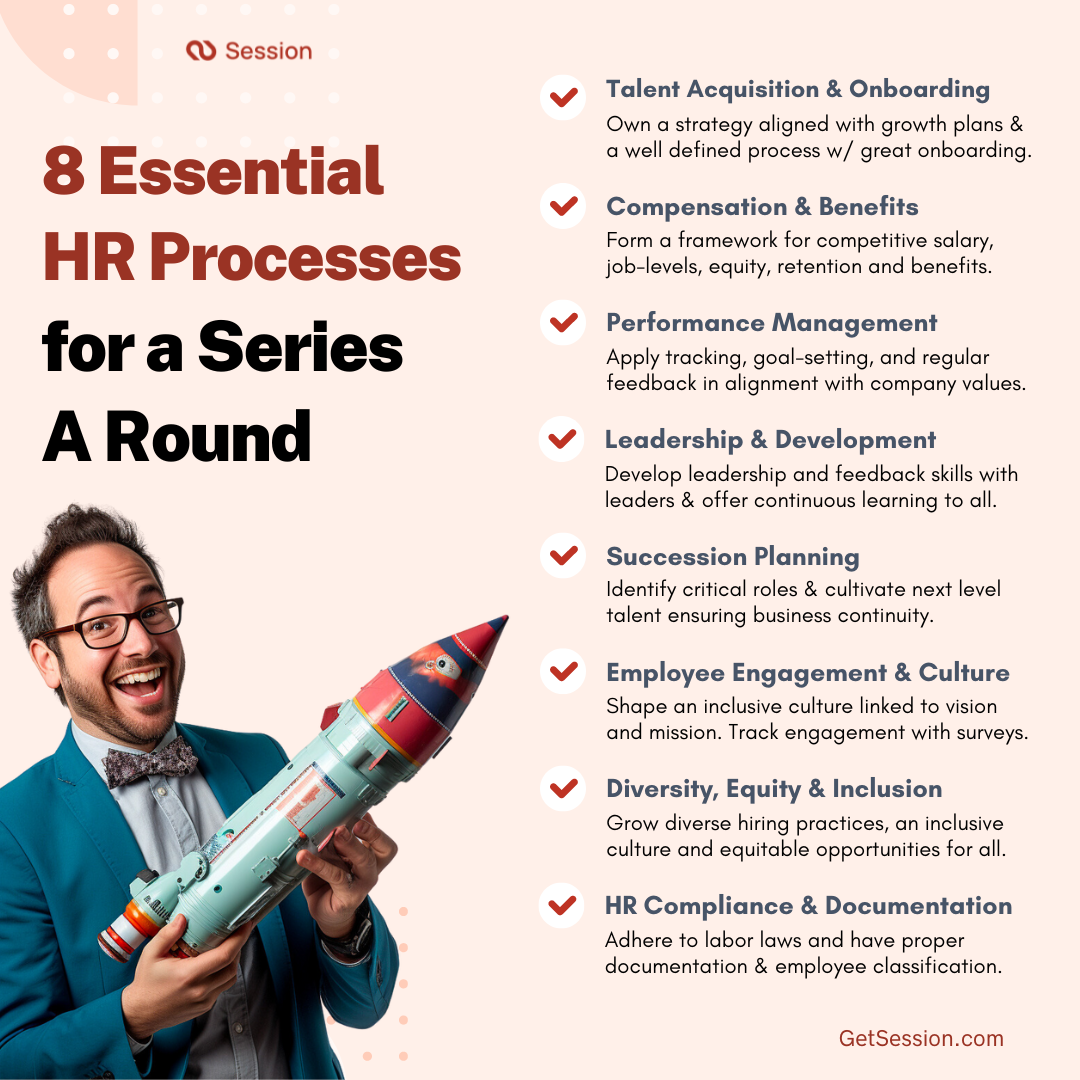When a company is seeking a Series A investment, it is essential to have certain HR processes in place to demonstrate to potential investors that the company has a strong foundation and is well-prepared for growth. Some important HR processes that a company should have in place for the Series A include:

- Talent Acquisition & Onboarding: The company should have a talent acquisition strategy which is aligned with the growth plans for the company. On top of this it needs a structured recruitment and onboarding process to ensure that they are attracting and hiring the best talent. This includes having clear job descriptions, a job leveling framework, effective job postings, well-structured interviews, and a thorough onboarding process to get new employees up to speed quickly.
- Compensation and Benefits: Building on the job leveling framework, the company should have a clear compensation and benefits package in place to attract and retain top talent. This includes a mix of salary, equity, and benefits such as healthcare, maternity/paternity plans, and other perks. Compensation packages need to be benchmarked against industry standards at regular intervals to ensure competitiveness.
- Performance Management: The company should have a performance management system in place to track and evaluate employee performance. This includes using the job leveling framework to set clear goals and manage expectations, providing regular feedback, and conducting formal performance reviews. It should be clearly described how this is done, what the process is, how the process is introduced to leadership, how it is ensured that the process is being followed and how well the employees respond to/engage in the process.
- Leadership, Learning & Development: Building a successful company requires great leaders and talented employees. Leadership is a discipline in itself and it requires learning, reflection and coaching. Therefore, having well-described strengths based leadership principles, and a leadership development programme is paramount. It should enforce a culture of performance, continuous feedback, learning & development and it should support a great team spirit. Continuous learning and development opportunities should be offered to all employees. This ensures that everyone can remain relevant in their roles.
- Succession Planning: Startups depend on excellence and leadership from a small handful of people. The presence of the right people in specific roles at the right time can make it or break it for the company. But this also makes the company fragile. In order to build in antifragility, the company must Identify critical roles and cultivate next level talent in order to ensure business continuity in case critical people leave or need to take other roles. Continuous training, coaching and mentorship programs are essential. Clear guidelines for transition processes should be established, minimizing disruptions. A robust succession plan signals to investors the startup's commitment to long-term growth and resilience, making it a more attractive investment proposition.
- Employee Engagement and Culture: The company should have a plan in place to keep employees engaged and motivated. This includes creating and sustaining a positive work environment (and how to get there), providing opportunities for professional development (and what the opportunities are), and recognizing and rewarding employee achievements (and how this is done). Also, engagement should be supplemented with development plans for each employee, to foster a learning culture in the company and add to the accountability - which will both be good for the employee and the company’s performance overall.
- Diversity, Equity & Inclusion: Lack of diversity, equity and inclusion will have a negative impact on your performance, culture and growth. Make sure to implement hiring practices that promote diversity in the workforce. Create an environment where all employees, regardless of background, feel included and heard. Ensure fair treatment, access, opportunity, and advancement for all employees. And finally - keep track of your DEI commitments.
- HR Compliance and Documentation: The company needs to ensure that they are in compliance with all relevant labor laws and regulations. This includes keeping up to date with changes in labor laws and regulations, ensuring that all employees are properly classified, and maintaining accurate and up-to-date employee records.
Having these HR processes in place can demonstrate to potential investors that the company has a strong foundation and is well-prepared for growth. It can also help the company attract and retain top talent, which is crucial for success in the long run.











